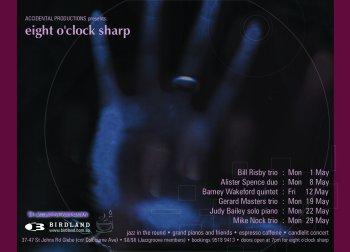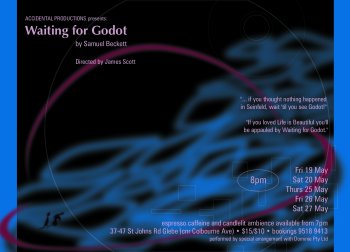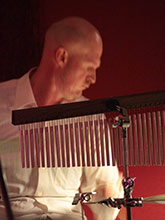Colbourne Ave started after musician Spike Mason was travelling around Europe in 1996. He went to some beautiful jazz concerts that were acoustic, and more like concerts than he was used to in the Sydney jazz scene. One of these was in the round, and it was so moving and intimate that he decided to try and recreate the experience in his own scene back home. After much searching, he found that the church in Glebe he was working for had perfect acoustics for listening. From 2000 to 2009 the venue was called "eight oclock sharp", the name of the first ever series - a season of the play Waiting For Godot with five jazz piano concerts. There was a very strict 'no talking during the music' rule, and the promise that the music would start exactly on time - eight oclock sharp!
Over the years, and with help from Andrew, Barney, and the CafeChurch community, the concert series grew from half a dozen performances a year - almost always acoustic, often in the round with great musicians and respectful audiences - until in 2008 they organized their third 'Jazz Piano Master Series' with sixteen solo pianists over four weeks. It was so good they decided they had to do it every week! Over the next couple of years we managed to organise a consistent series of concerts, and changed our name to Colbourne Ave.
-
08 May 2000Jazz Program 2000

The inaugural Eight Oclock Sharp featured a grand piano, and a selection of Sydney's greatest improvising pianists.
1st may
Bill Risby trio
Our first official night. Bill was the perfect choice. The music was very beautiful. Steve Elphick recorded the concert and Bill released it as an album, which you can buy on his website. www.billrisby.com
8th may
Alistair Spence
Alistair is a very musical pianist, and a very unique and dedicated composer. He invited the Australian Jazz Musician of the Year award winning saxophonist Sandy Evans to join him for a wonderful performance of some of Alistair's most beautiful compositions.
12th may
Barney Wakeford
Barney is the dark horse of the Sydney jazz scene. His compositions are moody and evocative. This concert was filled with all the wonderful things that Barney brings to his playing, melody, surprise, space, joy and groove.
15th may
Gerard Masters
22nd may
Judy Bailey
Judy played some amazing solo pieces in her own wonderful style, and then invited some guests to play some lovely long formed and twisting jazz standards. The guests were David Symes on double bass and Spike Mason on saxophone.
29th may
Mike Nock
Read 4035 timesFeaturing
-
19 May 2000theatre program 2000

The 2000 season included a sell-out production of Waiting for Godot, which was part of the inspiration for our name.
19th - 20th - 25th - 26th - 27th May
Waiting for Godot
director - James Scott
Pozzo - Brian Mott
Lucky - Andrew Filmer
Lucky - Estragon (Gogo) Michael Lewis
Vladimir (Didi) - James ScottWith special thanks to The Actors College of Theatre and Television, Alison Avery, Cafe Church, Danes Gourmet Coffee, Mal Heap, Hot M, Ian Baldwin, Rick Bull, Sue Hanna, Cathy Kirkpatrick, Andrew Lorien, Spike Mason, Graham Meredith, Jon Ollis, Elizabeth Scott, Jacqui Winn.
Director's Notes
When I first read Waiting For Godot in 1988, the play astonished me. Apart from the sheer beauty of the language, and the play's perception of the human spirit, I loved the unashamed contrast between the prosaic and the ethereal. The play jumps around from philosophical dialogue to mundane questions of whether carrots are better than turnips, to plain old vaudeville comedy. It was also one of the funniest plays I had ever come across.
Another aspect of the play that intrigues me, and one that has caused many challenges in putting hte play on the stage, is the notion that a story line does not have to progress to be entertaining. Beckett shows that it is people and their reactions to situations that make plays exciting, not just the unfolding of a plot.
What I have tried to do in this production of the play is fuind the balance between hope and futility. Society is built around individuals having to wait. Be it for a train, a doctor's appointment, or for a live person on the bank's helpline, we experience waiting every day. It is what we do while waiting that colours our life.
I have also been interested in the major characters' levels of awareness of their situation and of an outside force on their lives - whether that force is God, Godot, or perhaps the playwright himself. Lucky seems hyper-sensitive to these forces, but he is unable to express this clearly. Vladimir understands that there is something out side his world, but never really knows that to do about it. Estragon is more interested in how it affects his baseic needs (God have pity on me! On me! On me!) And Pozzo seems blind to all spiritual issues, and this is made literal in the second act.
My hope is that you, the uaudience, will travel a spiritual journey through the play.
james scott
Read 2800 times
ADDRESS
cnr Colbourne Ave and St Johns Road, Glebe ( google map )
WHEN
Thursdays from 8pm
BYO
anything you like - dinner, snacks, beverages, friends (glasses provided).
COST
$20 / $10 concession for all concerts
STYLE
Comfortable lounges, candlelight, all ages welcome.
THE LIST
Please join our mailing list.


























